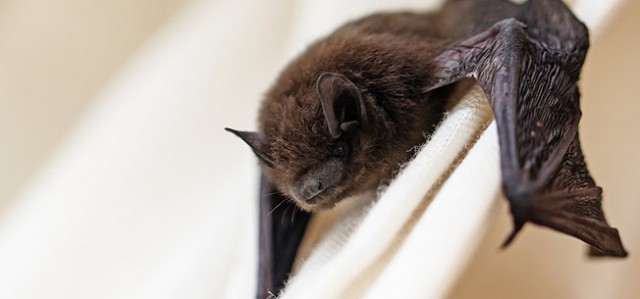Bats Plus Bed Bugs Equals... Bat Bugs?

As prolific pests throughout New England, both bats and bed bugs have established themselves as problems for many homeowners. We’ve all heard different bed bug horror stories, and bats are an inherently creepy species. However, you may not realize that the two drastically different species are actually closely intertwined.
Bed bugs originated in between mattresses and box springs, right? Seeing as bats sleep suspended by their claws and not on a quilted pillow top, this assumption couldn’t be further from the truth. Yes, you read that correctly. It has been determined that bats are the ancestral host of bed bugs. As modern humans sought refuge outside of the confines of Africa, they started to dwell in caves throughout Eurasia. Bats roost in caves for the same reasons that humans chose caves; dependable shelter from both conditions and predators. Seeking the same amenities, bats and humans have coexisted for a very long time. Bats have essentially been in our "attics" since we migrated into Asia around 80,000 years ago. This means that, unfortunately, so have bed bugs.
I’ve Got Bed Bugs, Do I Also Have A Bat Problem?
The short answer here is no. In fact, bed bugs have been evolving over time into two separate species altogether. Bat bugs that have lived off of their vampiric, winged hosts for many millennia (Cimex Adjunctus) are not the same species that generally plague human households today. Cimex Lectularius, or the bed bugs that feed off of humans, are the most common species and have adapted to human environments. These resilient pests have also developed resistance to many pesticides and insecticides, evolving with genetic mutations that make them even more of a nuisance.
We all have our favorite restaurants. Parasitic insects, like bed bugs, have their own biases towards meals as well. The pip-sized pests tend to stick with their preferred hosts. If you are dealing with a bed bug infestation it’s almost always the human-specific species. This means that, in terms of having both bats and bed bugs, experiencing issues with the latter does not necessarily mean that your attic is infested with bats.
Bat Away Both
On the flip side of this, if you are struggling with a bat problem, you are more prone to a bat bug infestation. Bat bugs will not feed on human hosts if there are bats readily available, but as bats are removed, migrate, or die, the bugs they leave behind will seek the closest substitute for a meal. We do not suggest that you attempt to handle a bat situation on your own. One problem often leads to another. If you are to remove a few bats from your attic, you are eliminating hosts for the bugs associated with them, making you and your family more susceptible to an infestation.
It’s important to identify the type of bug that is in your home. In most cases, if you have a noticeable infestation, you have a bed bug problem. As we mentioned before, bat bugs prefer to feed on bats and are more likely to “accidentally” find you than to band together for an infestation. If you’ve only noticed a few bugs, it’s time to put them under a magnifying glass. Bat bugs will have longer hairs than bed bugs. Many companies will fail to properly identify bat bugs, leaving homeowners with a bat bug problem after spending thousands of dollars on bed bug treatments.
At often times people resort to killing bats within their homes. This is not only the wrong way to do things, it also presents the possibility of more issues. With bat conservation in mind, given their ecologically beneficial nature, we handle household bat problems in a humane manner. Bats easily find new places to dwell, so relocation to their natural environment is the end-game.
They’ve got wings, but they won’t be flying back. JP Pest Services provides a 10-year warranty on all guaranteed bat exclusion services. Our exclusion services include bat bug treatments to ensure that neither pest bother you again. Whether bed bugs or bats, or both, we have you covered. Contact us today!



